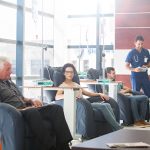-
Real-world Outcomes in Multiple Myeloma
Study shines a light on the differences in outcomes between clinical trial patients with multiple myeloma and those receiving cancer treatment in their community.
by Sandra Gordon
-
January 26: The Week in Cancer News
Questions about screening for women with dense breast tissue, and the FDA asks drugmakers to add a warning to labels for CAR T-cell therapies.
by Thomas Celona
-
Some Breast Cancer Patients May Safely Skip Radiation
Three presentations at SABCS in December find that it may be safe in certain cases for people with breast cancer to go without radiation.
by Cancer Research Catalyst
-
January 19: The Week in Cancer News
Preventive gastrectomy has lasting effects, and rising cancer incidence undercuts continued progress against mortality.
by Eric Fitzsimmons
-
January 12: The Week in Cancer News
Hiding serious illness can be a coping strategy, and cancer rates are on the rise among young people.
by Kevin McLaughlin
-
Doctors Urge Need for ‘Common Sense Oncology’
A movement of health care professionals say the toll of many cancer treatments is out of sync with the purported benefits.
by Kyle Bagenstose
-
January 5: The Week in Cancer News
The FDA will review a blood test that detects colon cancer, and a writer recounts his sister’s decision to receive medical aid in dying.
by Marci A. Landsmann
Cancer Talk
Celebrity Cancer Stories Can Lack Important Information
News coverage about public figures facing cancer frequently leaves out key details about the diagnosis and fails to provide background information on cancer.
by Laura Gesualdi Gilmore
AACR Annual Meeting 2025Immunotherapies, cancer vaccines and more from Cancer Today’s coverage of the AACR Annual Meeting 2025.
Redefining Cancer SurvivorshipAs people with advanced disease live longer, they face physical and mental health side effects. Patient advocates say research and care must focus on their unique needs.
by Thomas Celona
Family of Henrietta Lacks Works for ‘Health Intelligence’Alfred Lacks Carter Jr. and other family members honor the legacy of Henrietta Lacks by helping others better understand their health care.
by Kevin McLaughlin











